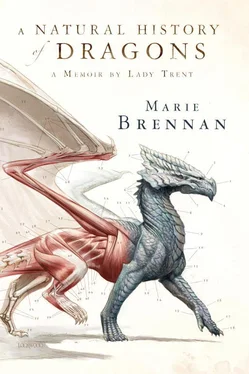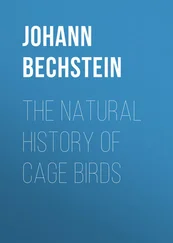“Extraordinary breath,” Mr. Camherst murmured, looking across at the motionless lump of the green dragon.
I recognized the phrase from A Natural History of Dragons; it was the term Edgeworth had coined to describe the sixth and final characteristic he considered diagnostic of the true dragon. All such species could expel something additional with their breath, whether it was the legendary fire or otherwise.
The general theory for young ladies at the time was that curiosity was considered more attractive to young men than knowledge. Armed with this dubious advice, I ventured a question to which I already knew the answer. “What does it breathe?”
To my disappointment, Mr. Swargin answered in Mr. Camherst’s place. “A noxious fume, miss,” he said. “Very unpleasant, and harsh on the lungs. At feeding times, we lower large boards into the gaps you see, between the pens; that keeps the worst of it away from the other two when we unmuzzle the Moulish for his meal.”
“I imagine the albino would have a hard time of it, in particular,” Mr. Camherst said.
“Surprisingly not, sir. For a runt and an albino, it’s quite robust; don’t let its appearance fool you. The Akhian has the worst of it—but then, she’s a bit of a dramatic thing.”
She. For the first time, I noticed that Mr. Swargin was using gendered pronouns to refer to the dragons. The Akhian, the gold dragon currently pacing at my feet, was a female. I tried not to stare. Thank heavens the Moulish was curled up, so I didn’t embarrass myself trying to spot anything.
An anomaly distracted me. The Akhian was female, and the Moulish male, but for the Vystrani, Mr. Swargin said “it.” I voiced this thought to the naturalist, only realizing that it might be considered inappropriate after I had already said, “What sex is the albino?”
“None, miss,” Mr. Swargin said. Mr. Camherst had turned back to listen; I hoped he didn’t think me scandalous for asking. “Rock-wyrms don’t…” His eyes slid toward me. “They don’t develop such characteristics,” he continued, apparently amending the phrase he would have used, “until maturity. The Vystrani remains immature, and therefore neuter.”
This was fascinating, and I wanted to ask more. I wasn’t sure how to feel when Mr. Swargin spotted one fellow leaning over the railing by the swamp-wyrm’s pen and said abruptly, “Pardon me,” rushing over to intervene. It saved me from the chance to ask further inappropriate questions… but it left me alone with Mr. Camherst.
And with my brother—who would have done splendidly as a young lady, at least where the matter of curiosity versus knowledge was concerned. He knew no more of dragons than your average young man, which is to say, that they were huge and scaly and had wings, which was very pleasing to the part of him that was still an eight-year-old boy. He began to question Mr. Camherst himself, which gave us sufficient reason to remain in the man’s company until the time came for us to retire to the lawn outside of (and, I might add, upwind of) the menagerie. By then I had managed to address a small handful of other remarks to the man, rendering myself agreeable enough that he obtained a lemonade for me before the ebb and flow of socialization carried him away.
(Or perhaps it was not my conversation that charmed the man, although I’m sure he was glad to have someone take an interest in him for some reason other than his wealth. I recall very little of what I wore that day, but I do know I had changed from the bony girl who went after a wolf-drake, and the dresses sewn for my Season did intriguing things with my bosom.)
Mama was displeased to hear where I had gone, and only somewhat mollified by a suitably edited account of my introduction to Mr. Camherst. His fortune and breeding were both acceptable, but she sniffed at my enthusiasm for his company. “Don’t waste your time where it will do no good, Isabella. I know of the man, from Mrs. Rustin. He isn’t looking for a wife.”
I knew better than to tell her I wasn’t looking for a husband, not in this instance. In truth, a part of me felt rather wistfully that it was a pity Mr. Camherst was not on the market. I felt no rushing swell of adoration for him, such as Manda Lewis dreamed of—but he was acceptably handsome, acceptably personable, and acceptably rich; Mama might dream of me snaring a certain bachelor viscount, but she would not instruct me to say no if Mr. Camherst offered. I hoped whatever husband I caught in the end would permit me a friendship with him; he seemed a very nice man.
That was not the end of my search for a husband, of course. There were dances and card parties, sherry breakfasts and afternoon teas: all the whirling life that accompanies a Season in Falchester. There were also gossiping mamas, discreet inquiries into familial finances, and scandalous tales of heritable dementia: all the backstage machination that accompanies the hunt for spouses. Frankly, I prefer the worst of the trials and initiations I’ve been required to endure in pursuit of my research. But despite my naive intentions, I found myself more and more in the pleasing company of Mr. Camherst. This culminated in a certain evening at Renwick’s, when he asked if he could call on us the following afternoon at our hired house in Westbury Square.
Even such a dullard as I could not miss what he meant by the request. I barely had time to stammer out permission before Mama whisked me home and put me to bed with orders that I should not be roused before ten, as it would not do for me to look tired the next day. (This was something of a problem for me, as I woke at eight and was not permitted to rise for two hours. I had unwelcome memories of my convalescence from my torn shoulder.)
As soon as the clocks chimed ten, however, everything went into motion. I was bathed and dressed with more than the usual care, and my hair styled to perfection. We ate a tense late breakfast, during which I almost snapped at Mama to take her nerves elsewhere. I cannot pretend I was entirely composed myself, but certainly her jittery behaviour put me more on edge.
Following the meal, I was sent upstairs to change from morning clothes into more respectable afternoon dress. Mama came with me, and chose and discarded four possible gowns before the doorbell rang. Looking harried, she reverted to her second selection, ordered my maid to dress me as quickly as possible, and rushed downstairs.
The caller was, as expected, Mr. Camherst, and when I was quite as primped and polished as I could be, I made my way to the sitting room.
Mama was there with him, occupied in polite chatter, but she rose with alacrity when I appeared. “I will leave you two to talk,” she said, and closed the doors behind her as she departed.
I was alone in a room with an unmarried man. Had I needed any further proof of what was about to occur, that would have done nicely.
“Miss Hendemore,” Mr. Camherst said, stepping forward to take my hand. “I trust you are well?”
“Yes, quite,” I said, marveling inwardly at the inanity of small talk in a situation such as this.
As if he heard my thoughts, Mr. Camherst hesitated, then smiled at me while we settled into our chairs. There was, I recall, a hint of apprehension in his eyes. “I’m afraid I don’t know the finer points of how this is done—I had not really considered it in advance—but I don’t imagine either of us would benefit overmuch from my delaying. As I’m sure you’ve guessed by now, I have come here today to ask you to marry me.”
Saying it with so little drama might be the most merciful thing I ever saw him do, but it still took my breath quite away. When I regained the ability to speak, unfortunately, my words were not at all what they should have been.
Читать дальше












